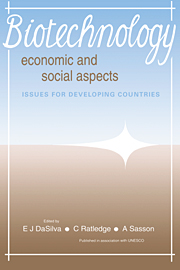Book contents
- Frontmatter
- Contents
- List of contributors
- Preface
- 1 Biotechnology: the socio-economic revolution? A synoptic view of the world status of biotechnology
- 2 Bioethanol production: economic and social considerations in failures and successes
- 3 Biofertilizers: agronomic and environmental impacts and economics
- 4 Microalgal biotechnology: is it an economic success?
- 5 Production of useful biochemicals by higher-plant cell cultures: biotechnological and economic aspects
- 6 Mushroom production – an economic measure in maintenance of food security
- 7 The economic viability of Single Cell Protein (SCP) production in the twenty-first century
- 8 The impact of biotechnology on international commodity trade
- 9 Biotechnology: socio-economic considerations, intercultural perspectives and international viewpoints
- 10 Joint microbial biotechnological ventures in developing countries: social promises and economic considerations
- 11 The economic and social implications of gene technology to developing countries
- 12 Making biotechnology appropriate – and environmentally sound
- 13 Information support for research and development in biotechnological applications
- 14 The effects of emerging biotechnologies on plant and animal agriculture – a viewpoint
- Index
13 - Information support for research and development in biotechnological applications
Published online by Cambridge University Press: 04 August 2010
- Frontmatter
- Contents
- List of contributors
- Preface
- 1 Biotechnology: the socio-economic revolution? A synoptic view of the world status of biotechnology
- 2 Bioethanol production: economic and social considerations in failures and successes
- 3 Biofertilizers: agronomic and environmental impacts and economics
- 4 Microalgal biotechnology: is it an economic success?
- 5 Production of useful biochemicals by higher-plant cell cultures: biotechnological and economic aspects
- 6 Mushroom production – an economic measure in maintenance of food security
- 7 The economic viability of Single Cell Protein (SCP) production in the twenty-first century
- 8 The impact of biotechnology on international commodity trade
- 9 Biotechnology: socio-economic considerations, intercultural perspectives and international viewpoints
- 10 Joint microbial biotechnological ventures in developing countries: social promises and economic considerations
- 11 The economic and social implications of gene technology to developing countries
- 12 Making biotechnology appropriate – and environmentally sound
- 13 Information support for research and development in biotechnological applications
- 14 The effects of emerging biotechnologies on plant and animal agriculture – a viewpoint
- Index
Summary
Introduction
The quality of contemporary research and development depends to a large extent on the efficiency of the international transfer of scientific information. Furthermore, the use of information methods and techniques is of significance in setting up research hypotheses, as well as in teaching and learning.
The importance of technical information for research continues to grow. In the past, science was characterized by objective observation, powerful methods and techniques, and ability for prediction. Today, these characteristics are increasingly combined with the transfer of results into production, environmental protection and decision-making processes. Patents, technical reports and know-how offers have found their place next to scientific papers and conference reports. In applied disciplines, patents are often published before scientific papers. Biotechnology is a typical example of such a field.
The introduction of scientific and technical information into education and research is of undeniable importance also for another reason. Most highly developed universities have their ‘silicon valleys’, often labelled as ‘science parks’ or ‘university developmental enterprises’, where new scientific achievements serve as the basis for small-scale entrepreneurship, with the hope of at least some production and/or environmental protection on a larger scale. These activities have to compete in the world market, i.e. they have to have access to and to use the newest scientific, technical and economic information. Such information cannot be found in textbooks only.
- Type
- Chapter
- Information
- Biotechnology: Economic and Social AspectsIssues for Developing Countries, pp. 309 - 353Publisher: Cambridge University PressPrint publication year: 1992
- 1
- Cited by



